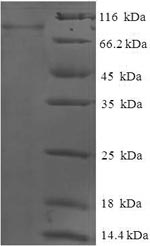Thanks for your inquiry.
Recombinant Human Glucokinase regulatory protein(GCKR)
CSB-EP622767HU >> E.coli
Tag information:N-terminal 6xHis-SUMO-tagged.
Sequence:
MPGTKRFQHVIETPEPGKWELSGYEAAVPITEKSNPLTQDLDKADAENIVRLLGQCDAEIFQEEGQALSTYQRLYSESILTTMVQVAGKVQEVLKEPDGGLVVLSGGGTSGRMAFLMSVSFNQLMKGLGQKPLYTYLIAGGDRSVVASREGTEDSALHGIEELKKVAAGKKRVIVIGISVGLSAPFVAGQMDCCMNNTAVFLPVLVGFNPVSMARNDPIEDWSSTFRQVAERMQKMQEKQKAFVLNPAIGPEGLSGSSRMKGGSATKILLETLLLAAHKTVDQGIAASQRCLLEILRTFERAHQVTYSQSPKIATLMKSVSTSLEKKGHVYLVGWQTLGIIAIMDGVECIHTFGADFRDVRGFLIGDHSDMFNQKAELTNQGPQFTFSQEDFLTSILPSLTEIDTVVFIFTLDDNLTEVQTIVEQVKEKTNHIQALAHSTVGQTLPIPLKKLFPSIISITWPLLFFEYEGNFIQKFQRELSTKWVLNTVSTGAHVLLGKILQNHMLDLRISNSKLFWRALAMLQRFSGQSKARCIESLLRAIHFPQPLSDDIRAAPISCHVQVAHEKEQVIPIALLSLLFRCSITEAQAHLAAAPSVCEAVRSALAGPGQKRTADPLEILEPDVQ
CSB-EP622767HU: N-terminal 6xHis-SUMO-tagged.
The Mw of the target protein (without tag) is 68.7 kDa, the Mw of the EP fusion protein (including the tag) is 84.7 kDa.
Regarding the activity. sorry, we haven't tested its activity and also haven't received the feedback about the activity from other customers.
In theory, what we provide is the full length protein, we adpot affinity chromatography for purification, so it's purified under very mild condition,
it's very likely to be active, the EP has already been successfully developed, and it has been ordered many times by other customers, we can send the COA for your reference.






